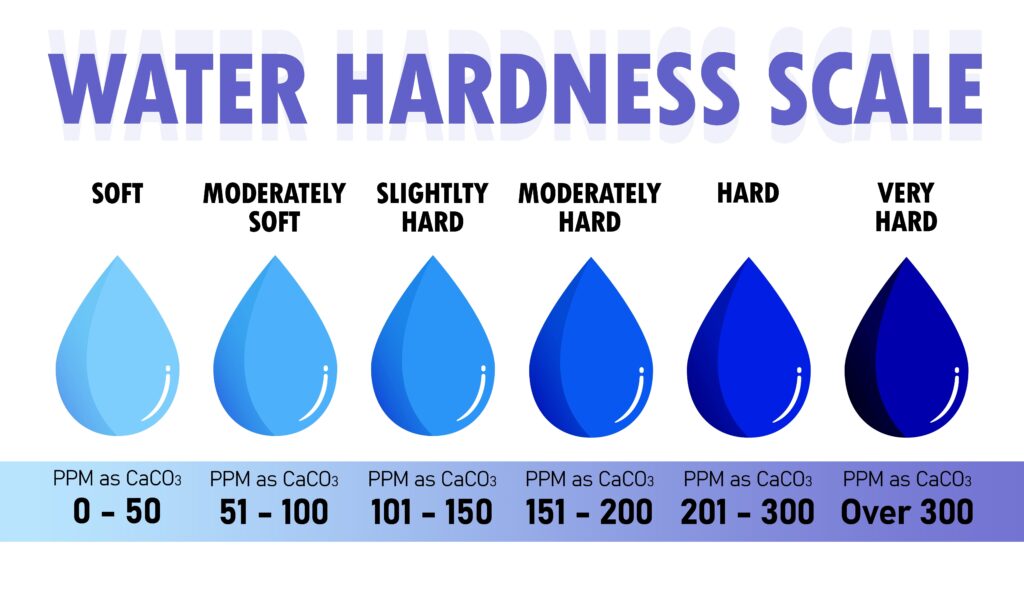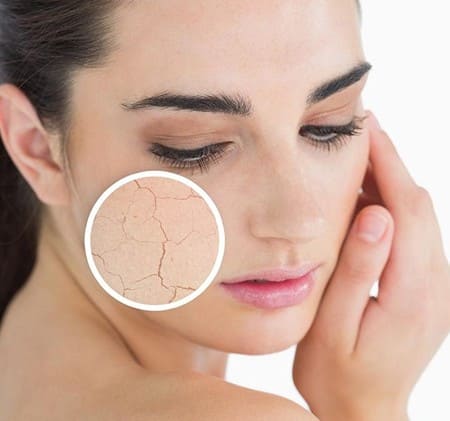Hard water issues can be menacing for households. High levels of minerals in hard water can damage plumbing, reduce appliances’ lifespans, and cause skin/hair damage.
Fortunately, there are convenient filtration products available to soften the water. Here’s everything you need to know about hard water and PureFlowz filtration solutions.

What is Hard Water
When water contains high levels of dissolved minerals, it is called “hard water.” Hard water is generally not a health concern. However, hard water has many negative consequences on the household.
Hard water leaves behind mineral deposits as it evaporates. This is known as hard water stains.
What Causes Hard Water?
Hard water occurs when naturally soft rainwater absorbs minerals as it moves through soil and rock, particularly limestone, chalk, or gypsum deposits. These minerals dissolve into the water, increasing its hardness.
Measuring Water Hardness (Grains per Gallon – GPG):
Water hardness is typically measured in grains per gallon (GPG) or parts per million (ppm). Soft water has less than 1 GPG, while very hard water contains over 10.5 GPG.
| Grains per Gallon (GPG) | < 1 | 3-7 | 7-10.5 | >10.5 |
| Water Hardness | Soft | Moderately Hard | Hard | Very Hard |
Hard Water Damages Plumbing and Appliances
As hard water flows through pipes, trace amounts of the dissolved minerals deposit on the pipe’s inner surface. Over time, these deposits build up and form a chalky substance called scale.
Scale build-up restricts water flow. It reduces water pressure and can also clog the pipes.
Hard water also accelerates rusting. Rusting weakens the pipes and causes leaks or bursts, which are costly to repair.
Scale build-up also affects water heaters. The minerals precipitate and accumulate in the heating parts. This buildup reduces the heater’s efficiency. Regularly flush the water heater to remove sediment to increase overall lifespan.
Hard water also damages other appliances that use water, such as dishwashers and washing machines.
Hard Water Leaves Residue on Dishes and Damages Clothes
You may have noticed a white residue on dishes, glassware, and sinks. This is called “soap scum.” Soap reacts with calcium and leaves behind this white residue.
The minerals in hard water also react with laundry detergent. This causes faster color fading as hard water reduces the detergent’s cleaning power. Clothes may feel stiff or rough due to the chalky mineral deposits which damage the fabric.

Hard Water is Detrimental for Hair and Skin
Effects on Hair
Does your hair feel dry, brittle, and more prone to breakage? This could be a sign of hard water.
The mineral deposits reduce moisture on the hair strands making them dull with a rough texture.
Over time, your hair might get flat and lifeless. Hard water also produces very little lather with shampoos. This can cause itchiness, dandruff, and irritation.
If you use color treatment for your hair, hard water may be fading the hair color quicker than anticipated. This leads to premature fading and uneven tones.
Effects on Skin
Hard water causes dryness and irritation, especially for people with sensitive and dry skin types.
Hard water creates a film on your skin that blocks moisture absorption. Over time, hard water may exacerbate skin conditions like eczema and dermatitis. Mineral deposits can clog pores, potentially leading to more acne breakouts.
Your skin may feel tight, dry, or even itchy after washing. This is because hard water reduces the effectiveness of soaps and cleansers. Moisturizers can temporarily help tackle this issue.
Should you Soften Water or Use a Water Filter?
Water softeners reduce scale build-up but do not filter out impurities.
Water softeners use an ion exchange process to reduce water hardness. In this process, hard water passes through a tank of resin beads that trap the minerals.
Water softeners may only deal with scale deposits in plumbing and appliances. They require maintenance and also increase sodium levels.
Water filters soften water and filter out impurities.
Activated carbon filters don’t remove calcium and magnesium but can reduce contaminants and improve water quality.
Reverse osmosis systems remove various contaminants but are more expensive. Beneficial minerals may be lost and RO systems also contribute to water wastage.
PureFlowz Hard Water Filter Solutions
Our advanced filtration systems reduce residual chlorine, impurities, and sediment.
PureFlowz Multi-Stage Filtration
Multiple layers work together to remove a wide range of contaminants.
- Sediment filter captures larger particles like dirt, rust, and sand.
- KDF (Kinetic Degradation Fluxion) filter removes chlorine, reduces heavy metals, and blocks bacteria and algae growth.
- Activated Carbon absorbs chlorine, chemicals, and organic compounds to improve the taste of water.
- Ceramic Balls balance pH levels and soften the water, making it gentler on the skin and hair.
Opt for a Vitamin C Filter
VC Beauty Shower uses the most sophisticated quality of edible grade Vitamin C. This filter removes chlorine, converts alkaline water into weakly acidic water, and removes reactive oxygen species.
VC filter reduces skin irritation, slows down aging, and protects your delicate skin.

Beauty Shower Filters
Transform your daily shower into a luxurious experience with the Beauty Shower Filter.
Features:
- Flow rate: 8L/min
- Precision filtration: 40 μm accuracy
- Long-lasting performance: 12,000L filter life
- Removes chlorine, heavy metals, and impurities
- Temperature range: 5°C–70°C
- Quick and easy installation
Pre-Filter for Shower
Upgrade your water filtration system with our advanced Pre-Filter for Showers.
Features:
- Pre-filters large particles for enhanced water purity
- Compatible with all standard shower systems
- Maintains water pressure: 0.1–0.5 Mpa
- Extends the life of your main shower filter
- Durable and easy to install

PureFlowz 2-in-1 Tap Filter + Foam Rinse Solution
Functions:
1. Purifies tap water with a 7-stage filtration process
2. Adds an extendable spray nozzle for foam or clean water rinse
Features:
– 4 Water Modes: Pure, Raw, Foam Rinse, Shower
– Automatic 0.2% detergent mixing in Foam mode
– Compatible with most faucets in the market
Frequently Asked Questions:
Is it better to drink hard or soft water?
Both soft water and hard water are safe to drink. However, it is always better to use filtered water which reduces contaminants and balances the mineral content. Learn more about water filtration here.
What is the difference between soft and hard water?
The mineral content is the key difference between soft and hard water. Hard water has minerals like calcium and magnesium while softened water may contain more sodium.
What is considered as hard water?
Hardness is measured in parts per million (ppm) or grains per gallon (GpG). A level above 1.0 GpG or above 17.0 ppm is considered hard water.
Does Boiling Tap Water Remove Hardness?
Boiling water can temporarily reduce hardness by precipitating calcium. However, don’t expect boiling to remove minerals or solve permanent hardness. Learn why you should use filtered water for cooking.
